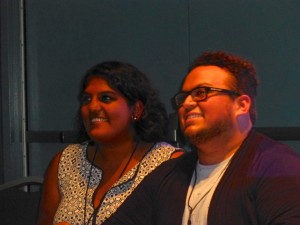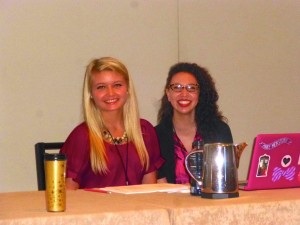
Four HSS students presented at the National Women’s Studies Association (NWSA) – Feminist Transgressions, November 13-16, 2014 in San Juan, Puerto Rico.
Aman Gill ’15 and David Sanchez ’16 presented: “Doing Feminist Activism and Research Digitally”

“Faculty and students will present together and discuss the possibility of using new digital tools to challenge and transform feminist pedagogies. This roundtable addresses the scholarly and activist potential—and problems—of using new digital tools in women’s studies classes. ” (NWSA Program) Their panel explored digital humanities; more specifically, they discussed how feminist research methods promote collaborative work and move away from inserting a narrative over the population we are working with. During the summer of 2014, Aman and David worked with a faculty mentor through the MUSE program, which facilitates undergraduate research and relationships between undergraduate students and professors.
This research focused on building a digital platform for women in Tanzania to share their stories relating to maternity and women’s maternal health. Although billions of dollars is being spent to address the haunting child mortality rate in Tanzania, little progress was made over a decade. This digital platform will hopefully serve as a venue for women to communicate with an audience of health practitioners and others who are not hearing what the women have to say about their own bodies and health. The presentation of this summer research focused on the specific tools we used to curate the stories and images collected from Tanzanian women during three workshops in rural Zanzibar. Additionally, we framed the project in the feminist theory and epistemology which influenced the way in which we presented this information.

Erin Rose Shannon ’16 and Natalia Zak ’16 presented: Labors of Love: Lessons Learned in Faculty-Student Research with Teenage Girls.
In it, the students discussed how power, age, and generation plays out when doing student-faculty qualitative research with teenage girls. It investigatesd relational dynamics in the research process across three generations of women and girls, and identifies lessons learned for future feminist “labors of love.”
